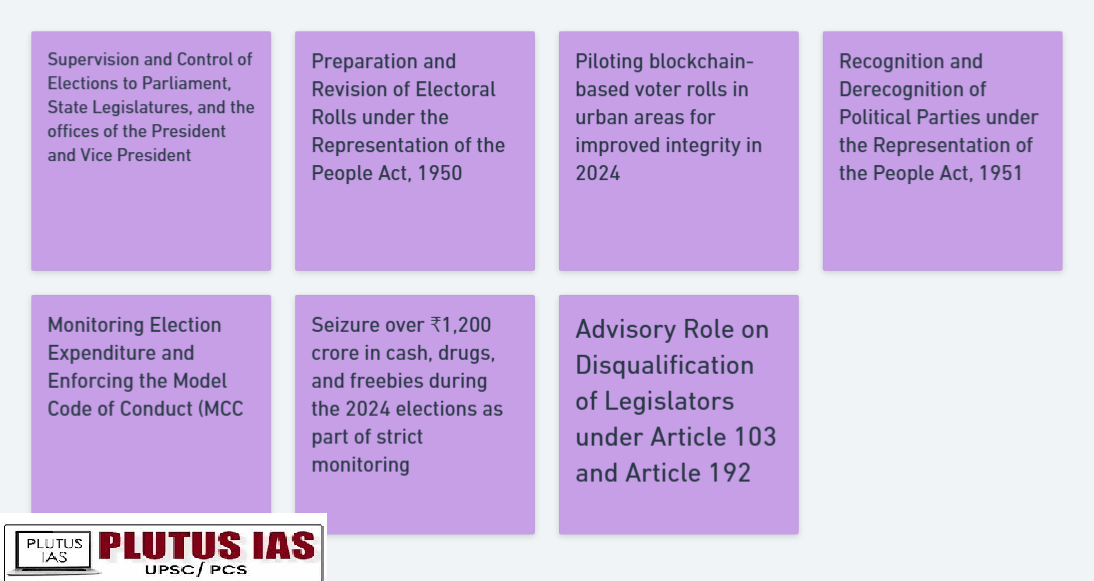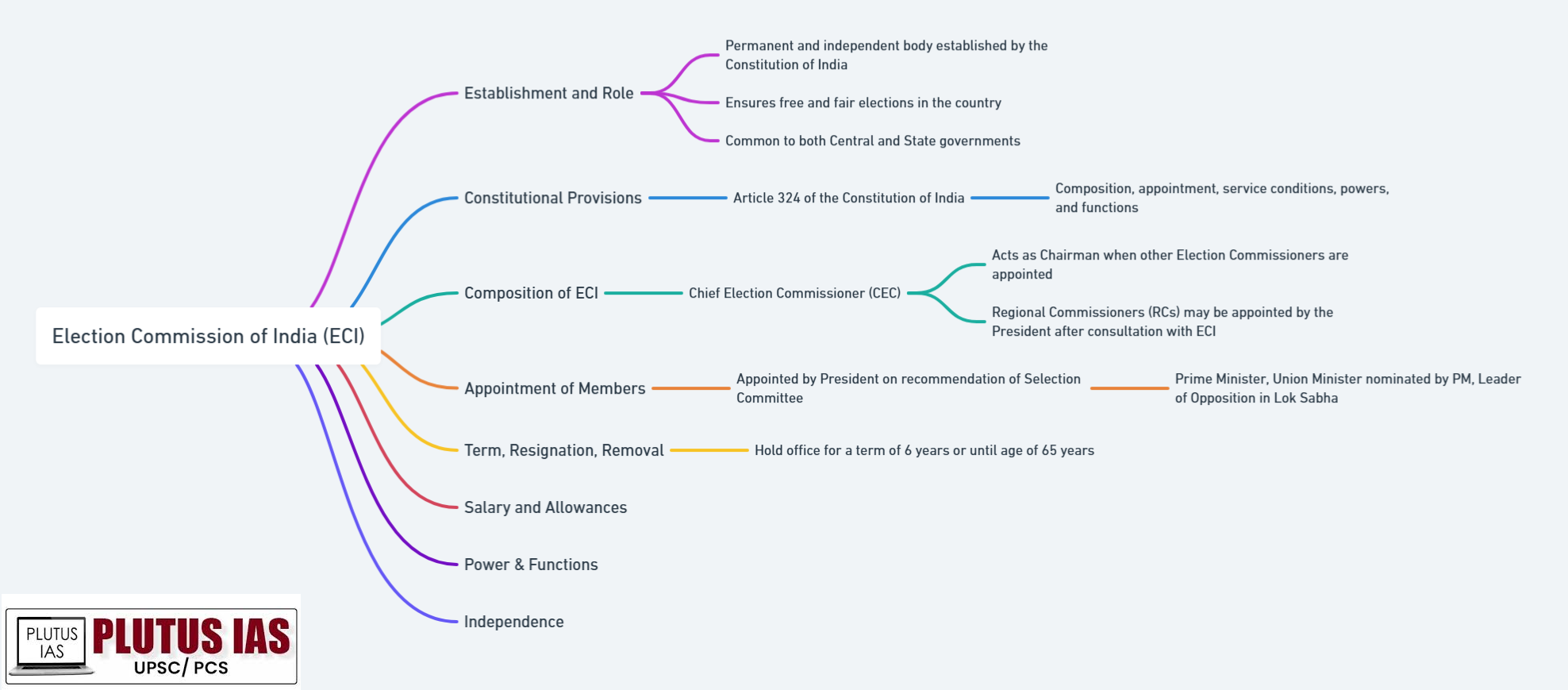05 May Election Commission of India (ECI): Guardian of India’s Electoral Democracy
This article covers “Daily Current Affairs” and the Topic Election Commission of India (ECI): Guardian of India’s Electoral Democracy
SYLLABUS MAPPING:
GS-02- Governance, Constitution, Polity: Election Commission of India (ECI): Guardian of India’s Electoral Democracy
FOR PRELIMS
The constitutional mandate of the Election Commission of India and its Role in India’s democratic journey.
FOR MAINS
Significance of the Supreme Court’s intervention in the cases, The challenges faced by the Election Commission
Why in the News?
In May 2025, the Election Commission of India unveiled ECINET, a unified digital platform integrating over 40 existing apps like cVIGIL, Suvidha 2.0, and the Voter Helpline. This move follows allegations of voter roll manipulation and EPIC duplication. Developed after wide consultations with 36 CEOs and 4,000+ election officials, ECINET simplifies user experience, enhances cybersecurity, and ensures only authorised data entries. It addresses voter concerns, improves transparency, and boosts digital efficiency. By centralising services and improving access for voters and stakeholders, ECINET represents a major step in modernising India’s electoral infrastructure and restoring public confidence.
What is the ECI?
The Election Commission of India (ECI) is an autonomous constitutional authority responsible for administering election processes in India. It oversees elections to the Lok Sabha, Rajya Sabha, State Legislative Assemblies, and the offices of the President and Vice President. Established on 25th January 1950, the ECI ensures that India’s elections are free, fair, and transparent. Celebrated annually as National Voters’ Day, this date commemorates its pivotal role in safeguarding democracy. The Commission also plays a critical role in educating citizens about their electoral rights. Over time, it has evolved into one of the most powerful election management bodies in the world. It also engages with international electoral bodies to share best practices and improve global democratic processes. Its reputation and operational standards have made it a model for many developing democracies.
Constitutional Mandate & Functions
The ECI derives its powers from Article 324 of the Constitution of India. It was initially a single-member body but became multi-member in 1993, consisting of the Chief Election Commissioner (CEC) and two Election Commissioners.
Key constitutional functions include:

Role of ECI in Strengthening Indian Democracy
1. Conducting Regular and Peaceful Elections: The ECI has ensured the smooth conduct of elections even during challenging times such as the Emergency (1975–77) and periods of communal violence. It has upheld constitutional continuity, giving legitimacy to governments. International observers have often praised India’s electoral resilience.
2. Embracing Technological Advancements: With the introduction of Electronic Voting Machines (EVMs) and Voter Verifiable Paper Audit Trails (VVPATs), electoral processes have become more efficient and secure. According to ECI data (2024), 100% of booths now use EVMs, significantly reducing counting errors and fraud.
3. Promoting Electoral Inclusiveness: The ECI introduced voter ID cards and enhanced accessibility for senior citizens and persons with disabilities. In 2024, over 1 million PwD electors availed transport and home-voting facilities. These reforms uphold electoral justice and broaden participation.
4. Monitoring Political Finance and Campaigning: The ECI has implemented expenditure ceilings, flying squads, and audit mechanisms to curb money power in elections. In the 2024 elections, over ₹1,200 crore of illicit cash, liquor, and freebies were seized, indicating stronger vigilance.
5. Encouraging Voter Participation: Through the SVEEP program, the ECI has driven voter education and turnout, especially among youth and marginalized groups. The 2024 Lok Sabha election saw a 67.4% turnout, the highest ever in India’s electoral history.
6. Upholding Institutional Neutrality: Despite political polarization, the ECI has retained public confidence through its impartial conduct. National and international reports, including by the EU Election Observation Mission (2024), commended ECI’s nonpartisan approach and professionalism.
Limitations of ECI’s Functioning
1. Lack of Power over Internal Party Democracy: The ECI has no authority to mandate internal elections or enforce transparency in political party operations. Political parties often centralize power and avoid disclosing candidate selection criteria or financial reports. For example, the ADR 2023 report highlighted widespread opacity in party functioning.
2. Delays in Disqualification for Electoral Malpractices: The ECI cannot unilaterally disqualify candidates for malpractice, depending instead on prolonged judicial processes. This allows accused individuals to contest multiple elections unchecked. In the Ashwini Kumar Upadhyay PIL (2023), the Supreme Court noted the need for time-bound trials of electoral offences.
3. Ambiguity in Appointment Process: The lack of a defined and transparent procedure for appointing Election Commissioners has raised concerns over executive overreach. Political appointments may compromise the Commission’s neutrality. The Anoop Baranwal case underscored this flaw and led to judicial intervention in 2023.
4. Limited Control Over Social Media Misinformation: Outdated legal frameworks constrain the ECI’s ability to counter digital misinformation effectively. Political advertisements and deepfakes spread unchecked. During the 2024 state elections, fake news over WhatsApp and YouTube significantly influenced voter behavior, as documented by the Election Watchdog India.
5. Inconsistent Enforcement of MCC: Critics argue that the ECI applies the Model Code of Conduct unevenly, appearing lenient toward ruling parties. This perception erodes trust in the Commission’s impartiality. For example, several complaints during the 2024 Lok Sabha elections went unaddressed, raising questions of bias.
6. Resource Constraints: The sheer scale of elections strains the ECI’s logistical and administrative capabilities. With over 900 million eligible voters and 1 million polling stations (2024 data), gaps in manpower and infrastructure are evident. States like Bihar and West Bengal reported EVM shortages and delayed polling staff deployments.
Key Judicial Interventions and Recent Cases
1. Anoop Baranwal v. Union of India (2023): Issue: The Supreme Court ruled that appointments to the ECI should be made by a committee comprising the Prime Minister, Leader of Opposition, and the Chief Justice of India, to ensure independence.
Significance: This judgment aimed to reduce executive influence in ECI appointments, reinforcing the Commission’s autonomy. The decision has catalyzed legislative debate on appointment reforms. It also reaffirmed the judiciary’s role in protecting democratic institutions.
2. Challenge to the Chief Election Commissioner and Other Election Commissioners Act, 2023: Issue: The Act, which altered the appointment process of Election Commissioners, faced legal challenges for potentially undermining the ECI’s independence. Status: As of May 2025, the Supreme Court is reviewing the Act’s constitutionality, with implications for the ECI’s autonomy. Critics argue that it dilutes earlier judicial safeguards. The case will set a precedent for future institutional appointments.
3. Electoral Bonds Case (2024): Issue: The Supreme Court declared the Electoral Bonds Scheme unconstitutional, citing violations of the right to information and electoral transparency. Outcome: The Court directed the State Bank of India to disclose details of donors and recipients, enhancing transparency in political funding. This has reshaped public discourse on election financing. It is expected to lead to more robust laws on campaign finance.
4. Voter List Irregularities in Maharashtra (2025): Issue: Opposition leader Rahul Gandhi alleged the addition of over 3.9 million names to Maharashtra’s voter list before local elections, raising concerns about electoral roll manipulation. ECI’s Response: The Commission denied irregularities and promised a written response. The matter is under judicial consideration as of May 2025. The case highlights the critical role of accurate electoral rolls. It also emphasizes the need for transparency in data management.
Recommendations for Strengthening the ECI
1. Transparent Appointment Process: Collegium-based appointment of Election Commissioners, as recommended by the Law Commission and Supreme Court in 2023, to ensure independence. This will ensure non-partisan selections. It also enhances institutional credibility in the eyes of the public. For instance, the Anoop Baranwal case (2023) led to a major judicial directive promoting impartial appointments.
2. Legal Backing for the MCC: Statutory backing for the Model Code of Conduct to make violations legally enforceable. This can deter unethical practices and strengthen enforcement. Legal sanctions can instill discipline among political actors. In 2019, despite clear violations, no punitive action could be taken due to lack of legal teeth.
3. Reforming Political Funding: Greater regulatory oversight on political funding, especially electoral bonds. A transparent funding system is vital to restore public trust. Strong audit mechanisms must be developed to track money flows. The 2024 Supreme Court judgment striking down electoral bonds underlined the opacity and risks of unchecked funding.
4. Tackling Digital Misinformation: Stronger laws to counter misinformation, hate speech, and misuse of digital platforms. Collaboration with tech companies can aid monitoring. Election-specific content regulations need to be modernized. A study by the Internet Freedom Foundation in 2024 showed that over 200 fake news items went viral during state elections.
5. Ensuring Inner-Party Democracy: Legislative empowerment to ensure inner-party democracy and stricter candidate qualifications. This will promote ethical leadership. Mandating internal elections and financial transparency can democratize political culture. The ADR 2023 report revealed that only 5% of national parties publicly declare inner-party elections.
6. Adequate Resources for the ECI: Adequate financial and human resources to manage increasingly complex electoral logistics. Training and capacity building must be prioritized. A permanent cadre of election professionals could be institutionalized. In the 2024 Lok Sabha elections, the ECI deployed over 11 million personnel, exposing critical gaps in logistics and training.
Conclusion
The Election Commission of India stands as a cornerstone of India’s democratic edifice. While it has played a commendable role in ensuring free, fair, and peaceful elections over the decades, its credibility must be constantly reinforced through institutional reforms and political will. A robust and independent ECI is essential not just for procedural democracy but for the deepening of participatory and ethical governance in the world’s largest democracy. Safeguarding its autonomy ensures that every citizen’s voice is truly represented in governance. As India evolves, the ECI must adapt to newer challenges such as artificial intelligence, cyber threats, and electoral data security. Strengthening the Commission will directly reinforce the very soul of Indian democracy.
Download Plutus IAS Current Affairs (Eng) 05th May 2025
MINDMAP:

Prelims Questions
Q.Which of the following functions are performed by the Election Commission of India under its constitutional and statutory mandate?
1. Supervising elections to the Lok Sabha and State Legislative Assemblies
2. Advising the President on disqualification of MPs
3. Declaring results of opinion polls
4. Conducting elections to the offices of the President and Vice-President
Select the correct answer using the code below:
(a). 1, 2 and 4 only
(b). 1 and 3 only
(c). 2, 3 and 4 only
(d). 1, 2, 3 and 4
ANSWER: A
Mains Questions
Q. Examine the significance of the Supreme Court’s intervention in the Anoop Baranwal case (2023) with respect to the appointment process of Election Commissioners. How can this strengthen the autonomy of the ECI. (250 words, 15 marks)




No Comments